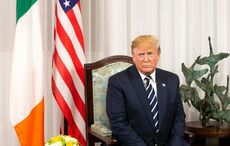The Governor of Ireland’s Central Bank has been bravely waving the flag in London for further financial integration across Europe, despite the Euro zone hardships being felt by the people of Greece, Spain, and elsewhere, and in his own country, of course.
And Patrick Honohan even chanced a pop at the USA in his speech at the Cass Business School at the City University.
“Cheerleaders for financial integration are having a hard time these days,” Mr Honohan told his audience. “It can seem that the financial crisis was exported from the United States and that the waves of liquidity surging around the world ended up washing away several years of growth in the advanced economies.”
Indeed, the Central Bank Governor added that it could fairly be said that “without the complacent expansion of credit by the globally integrated financial market countries like the United States, then Ireland and Britain wouldn’t be in the trouble that they find themselves today”.
However, Mr Honohan said he favoured looking at the wider and longer term issue of the approach that Ireland and other countries should be adopting in relation to financial integration.
He said, “After all, international financial integration is as much a product of technology as of liberalising financial policy and, as such, is with us whether we like it or not.
“Mostly we can like it, but it can and has run amok, so it needs well designed and policed regulation.
“My overall message is that we in these islands of Ireland and Britain have much in common as we work within European structures to develop more effective regulatory and policy regimes that will do a better job of handling financial integration than was managed in the first decade of the new millennium.”
The Central Bank Governor told his audience that it was in Dublin in 1933 that the economist John Maynard Keynes “made one of his earliest, most widely quoted and most succinct expressions of doubt about international financial integration”.
Keynes asserted: ‘Ideas, knowledge, science, hospitality, travel – these are the things which should by their nature be international. But let goods be homespun whenever it is reasonably and conveniently possible, and, above all, let finance be primarily national.’
Mr Honohan said for the elite of a newly independent Ireland who valued the financial stability they had inherited and retained from the colonial era, this was not a welcome message. Indeed, the message was largely ignored.
“The one-for-one exchange rate parity for the Irish pound with sterling embodied first in a currency board arrangement and then with a limited-function central bank, survived for almost another half-century, as did the banking and stock exchange links.”
Asking whether Keynes was right in 1933, Mr Honohan reflected that “provision of banking and other financial services by foreign firms can convey lower costs and greater sophistication as well as better risk-sharing – but can leave the host country high and dry if the service-providers choose to withdraw”.
He continued, “Both Ireland and Britain have experienced the rough and the smooth of this. But the information technology revolution implies that international financial integration is not a question of whether, but of how.”
He noted now the English, Scottish, and Irish banking systems had long been intertwined, reminding his audience that it was the Kerryman Daniel O’Connell -‘the Emancipator’ - who set up the National Bank in London in 1835.
“It was one of the seven great clearing banks, whose English branches later formed part of Royal Bank of Scotland (and now presumably heading to Santander) – with the goal of providing banking services ‘across borders’ into Ireland to compete with the monopoly which had been granted there to the Bank of Ireland.”
Mr Honohan said that for much of the past 200 years, London was the centre of global finance as well as of international economic relations generally. But the system had been “shaken by the evolving crisis from which it will emerge in a reconfigured form”.
“What will the role of London be in the reconfigured system, how will Ireland fare?” he asked. “These are key issues preoccupying you and me respectively, and they are not unrelated.”
Mr Honohan spoke of the need for a banking union in Europe, one for the European Union as a whole, not just the euro area.
Speaking about the upcoming referendum on the fiscal stability treaty, the Central Bank Governor said he did not believe that it would be rejected.
The 'No' campaign are "not all that numerous" he told the audience, saying that most were speaking out against austerity measures instead of engaging in euro-scepticism.
He concluded, “Some have taken the message from the euro crisis that financial integration has gone too far in Europe. My read is different.
“Inasmuch as any country that did not adequately operate sustainable macro and financial policies would suffer greatly from the denouement of policy deficiencies, the euro embodied a strong commitment device. The costs of that policy failure are being felt now.
“But the answer is not to fall back on the more autarchic policies of the 1960s and 1970s, but to try again, try better.
“The markets – gullible as we know they can be – naively assumed that the commitment device would be effective so that they need no longer fear unsustainable policies.
“They know better now, and so do the governments. Next time around will (to this extent) be different: this particular lesson has been learnt.”




Comments